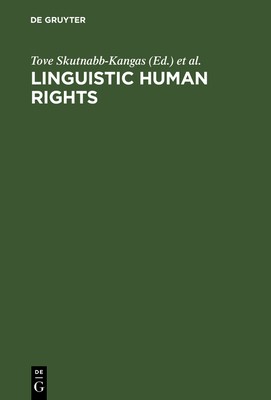
- We will send in 10–14 business days.
- Publisher: Walter de Gruyter
- Year: 1995
- Pages: 484
- ISBN-10: 3110148781
- ISBN-13: 9783110148787
- Format: 15.5 x 23 x 2.7 cm, hardcover
- Language: English
- SAVE -10% with code: EXTRA
Linguistic Human Rights (e-book) (used book) | bookbook.eu
Reviews
Description
Only a few hundred of the world's 6,000-7,000 languages have any kind of official status, and it is only speakers of official languages (speakers of dominant majority languages) who enjoy all linguistic human rights. As many of the collected papers in this book document, most linguistic minorities are deprived of these rights. This book describes what linguistic human rights are, who has and who does not have them and why, and suggests which linguistic rights should be regarded as basic human rights. Linguistic Human Rights introduces a new area, combining sociolinguistics, educational, and minority concerns with human rights. Discrimination against language minorities is widespread, despite national and international law prohibiting this. The book analyzes language rights in many countries worldwide, including North and Latin America, several European states, the former USSR, India, Kurdistan, Australia and New Zealand.
EXTRA 10 % discount with code: EXTRA
The promotion ends in 12d.11:27:10
The discount code is valid when purchasing from 10 €. Discounts do not stack.
- Publisher: Walter de Gruyter
- Year: 1995
- Pages: 484
- ISBN-10: 3110148781
- ISBN-13: 9783110148787
- Format: 15.5 x 23 x 2.7 cm, hardcover
- Language: English English
Only a few hundred of the world's 6,000-7,000 languages have any kind of official status, and it is only speakers of official languages (speakers of dominant majority languages) who enjoy all linguistic human rights. As many of the collected papers in this book document, most linguistic minorities are deprived of these rights. This book describes what linguistic human rights are, who has and who does not have them and why, and suggests which linguistic rights should be regarded as basic human rights. Linguistic Human Rights introduces a new area, combining sociolinguistics, educational, and minority concerns with human rights. Discrimination against language minorities is widespread, despite national and international law prohibiting this. The book analyzes language rights in many countries worldwide, including North and Latin America, several European states, the former USSR, India, Kurdistan, Australia and New Zealand.


Reviews